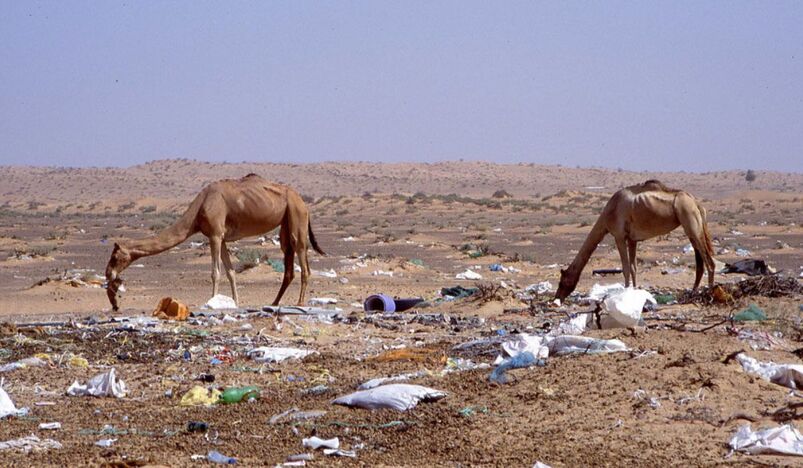
Camel mistaking plastic as food
The Ministry of Environment and Climate Change (MOECC) recently highlighted the detrimental effects of plastic waste on humans, animals, and the marine ecosystem in a series of posts and infographics on its X account, urging the public to reduce plastic use, dispose of it properly, and adopt eco-friendly alternatives.
The ministry noted that some animals consume plastic prevalent in the environment, mistaking it for food, which leads to a false sense of satiety and eventual weakness and death. Wildlife suffers from plastic accumulation as animals become entangled in plastic bags or ingest them, causing injury and death.
Government and official bodies worldwide, including the MECC, have been raising awareness about the dangers of plastic pollution, informing the public about its risks and environmental impact, promoting reduced usage, safe disposal, and the implementation of innovative practices and technologies to manage plastic pollution.
The ministry emphasized that plastic is hazardous not only in its pure form but also when it breaks down into more dangerous molecules that combine with soil elements and are absorbed by plants eaten by animals. This poses a risk to humans who consume these animals, affecting the entire food chain.
To preserve wildlife, the ministry urged people to dispose of waste in designated areas, highlighting that improper disposal of plastic can harm or kill fish, birds, or wild animals. They encouraged adopting sustainable practices to manage waste, reduce plastic pollution, and protect biodiversity.
The ministry stressed the importance of collective action in reducing plastic pollution to safeguard the environment and its biodiversity. They shared seven alarming facts about plastic's impact: 18 billion pounds of plastic flow into the ocean annually, 327 billion plastic bags end up in the sea, 320 million tonnes of plastic have been produced worldwide, plastic products remain in the marine environment for 450 years, plastic pollution will reduce Earth's oxygen by 70%, the amount of plastic is expected to double by 2034, and one in three fish consumed by humans has been exposed to plastic pollution.
The ministry concluded by urging everyone to take action by disposing of plastic responsibly, reducing usage, and switching to sustainable alternatives like reusable cloth bags, biodegradable bags, paper bags, straw bags, recycled bags, cardboard, glass containers, and metal packaging to protect oceans and the environment.
.jpg)
Qatar Secures Place Among the World's Top 10 Wealthiest Nations
.jpg)
Hamad International Airport Witnesses Record Increase in Passenger Traffic

Saudi Arabia: Any visa holder can now perform Umrah

What are Qatar's Labour Laws on Annual Leave?
Leave a comment